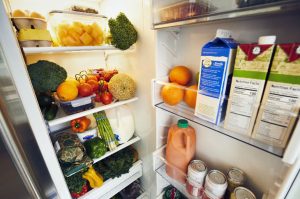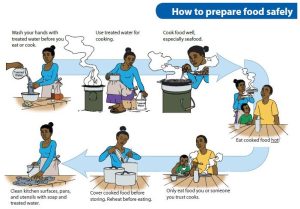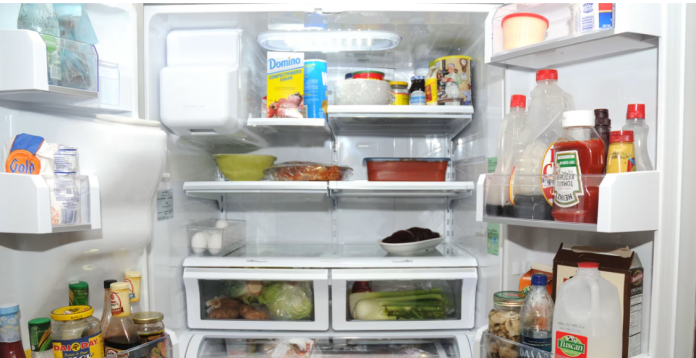Recently, the Director General of the National Agency for Food and Administration and Control, Prof. Moji Adeyeye, strongly advised Nigerians to refrain from storing cooked food in the refrigerator for more than three days.
Adeyeye warned that cooked food stored in the refrigerator for days is susceptible to contamination by disease-causing pathogens, which are key agents of foodborne diseases that can lead to death.
Again, physicians say the ongoing spread of cholera in many states in Nigeria and over 20 countries calls for safe handling of foods once they are brought into the house.
But then, the question is, are you storing food safely?
Nutritionists and gastroenterologists say that storing food properly can help prevent foodborne illnesses. Here are tips for safely storing food in your refrigerator, freezer, and cupboards.
Whether putting food in the refrigerator, the freezer, or the cupboard, you have plenty of opportunities to prevent foodborne illnesses.
Keeping foods chilled at proper temperatures is one of the best ways to prevent or slow the growth of bacteria
The goal is to keep yourself and others from being sickened by microorganisms such as Salmonella, E. coli, and C. botulinum, which causes botulism. Keeping foods chilled at proper temperatures is one of the best ways to prevent or slow the growth of these bacteria.
According to experts at the U.S. Food and Drug Administration, the following food storage tips can help you steer clear of foodborne illnesses.

Perishable foods
Nutritionist Dr. Omolola Craig counsels us to refrigerate or freeze perishables right away.
“Foods that require refrigeration should be put in the refrigerator as soon as you get them home.
“Observe the ‘two-hour rule’ for leaving items needing refrigeration out at room temperature. However, never allow meat, poultry, seafood, eggs, or produce or other foods that require refrigeration to sit at room temperature for more than two hours—one hour if the air temperature is above 90° F,” Dr. Craig says.
This also applies to items such as leftovers, and takeaway foods, she said.

Gastroenterologist, Dr. Monica Davies, says when putting food away, don’t crowd the refrigerator or freezer so tightly that air can’t circulate.
“Keep your appliances at the proper temperatures. Keep the refrigerator temperature at or below 40° F (4° C). The freezer temperature should be 0° F (-18° C). Check temperatures periodically,” she counsels.
Any food that looks or smells suspicious should be thrown out
Davies advised that many items other than meats, vegetables, and dairy products need to be kept cold, adding that if you’ve neglected to properly refrigerate something, it’s usually best to throw it out.
“Use ready-to-eat foods as soon as possible. Refrigerated ready-to-eat foods such as luncheon meats, because, the longer they’re stored in the refrigerator, the more chance Listeria, a bacterium that causes foodborne illness, can grow, especially if the refrigerator temperature is above 40° F (4° C),” the physician said.
The physicians urge families to be alert for spoiled food. “Anything that looks or smells suspicious should be thrown out,” they warn; adding, “Mould is a sign of spoilage. It can grow even under refrigeration. While mould is not a major health threat, it can make food unappetizing. The safest practice is to discard food that is mouldy,” Craig said.

They note that following recommended food handling practices will further reduce your risk of getting sick — clean your hands, surfaces and produce, separate raw foods from ready-to-eat foods, and cook to safe temperatures.
Refrigeration tips
Marinate food in the refrigerator. Bacteria can multiply rapidly in foods left to marinate at room temperature. Also, never reuse marinating liquid as a sauce unless you bring it to a rapid boil first.
Clean the refrigerator regularly and wipe spills immediately. This helps reduce the growth of Listeria bacteria and prevents drips from thawing meat that can allow bacteria from one food to spread to another. Clean the fridge out frequently.
Don’t store non-perishable foods near household cleaning products, chemicals, rat poison, etc.
Keep foods covered. Store refrigerated foods in covered containers or sealed storage bags, and check leftovers daily for spoilage. Store eggs in their carton in the refrigerator itself rather than on the door, where the temperature is warmer.
Check expiration dates. A “use by” date means that the manufacturer recommends using the product by this date for the best flavour or quality. The date is not a food safety date. At some point after the use-by date, a product may change in taste, colour, texture, or nutrient content, but, the product may be wholesome and safe long after that date. If you’re not sure or if the food looks questionable, throw it out.
The exception to this is infant formula. Infant formula and some baby foods are unique in that they must be used by the use-by date that appears on the package.
Freezer Facts
The USFDA says food that is properly frozen and cooked is safe. “Food that is properly handled and stored in the freezer at 0° F (-18° C) will remain safe,” it says; adding, “While freezing does not kill most bacteria, it does stop bacteria from growing.”
Infant formula and some baby foods must be used by the use-by date that appears on the package
Experts, however, warn that quality will decrease the longer the food is in the freezer. “Tenderness, flavour, aroma, juiciness, and colour can all be affected,” they warn.
They also note that freezing does not reduce nutrients. “There is little change in a food’s protein value during freezing,” they enthuse.
And if you’re worried about freezer burn, they say this does not mean food is unsafe. “Freezer burn is a food-quality issue, not a food safety issue. It appears as grayish-brown leathery spots on frozen food. It can occur when food is not securely wrapped in air-tight packaging, and causes dry spots in foods.”
the ongoing spread of cholera in many states in Nigeria and over 20 countries calls for safe handling of foods once they are brought into the house
Power failure problem
If you lose electricity, keep refrigerator and freezer doors closed as much as possible. “Your refrigerator will keep food cold for about four hours if it’s unopened. A full freezer will keep an adequate temperature for about 48 hours if the door remains closed,” Davies says.
They advise that refrigerated food should be safe as long as the power outage doesn’t last for more than four hours and the refrigerator door was kept shut.
And, very important, keep food away from poisons. Don’t store non-perishable foods near household cleaning products and chemicals.


